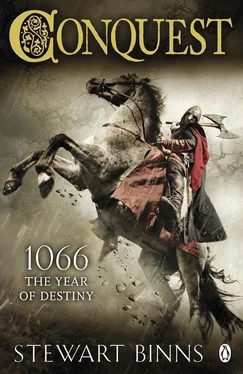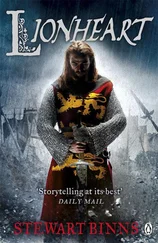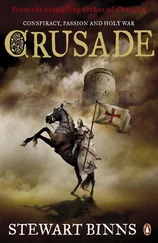‘And Siward Bjorn?’
‘He had left earlier, to go on a recruiting mission for more men. He said he was embarrassed that so few Englishmen had joined the revolt. What do you think we should do now?’
‘You have to go to King Malcolm. With William on the rampage like this, Scotland is the only safe place for you. I’ve never known anyone like him; he’s totally ruthless and utterly relentless. If he’s prepared to maraude through the Pennines in the middle of winter and massacre his subjects on the supposition that a few of them might be rebels, then nowhere in England is safe for you.’
‘But I’d prefer to come with you.’
‘That is not a good idea. I have my own plan, which will put you in harm’s way. I’ve had enough of avoiding William until the time is right; I’m going to confront him directly, not in a pitched battle, but close enough so that he knows it’s me. That will infuriate him and make him come after me. And when he does, I’ll be able to choose my ground and stand and face him.’
‘Then I should be at your side.’
‘No, my prospects are not great in such a challenge. You have to survive, albeit in exile in Scotland, Flanders, or wherever you choose, but you must live. You are the only legitimate heir England has. Can you rely on your men to get you to Scotland?’
‘Yes, I think so, now that you have reminded them of their discipline.’
‘Good, then our cause is not lost. We go on.’
‘Do you think William knows you lead the revolt?’
‘I’m sure he does. He must know by now that I was on Senlac Ridge. When we meet again, it will be quite a reckoning.’
Prince Edgar, the Saxon Atheling to the English throne, left within the hour. The patrol Hereward had despatched returned shortly afterwards and confirmed that the reports from York were true: William had split his force into several smaller groups, which were fanning out into every habitable part of Northumbria, hell bent on finding all the English rebels and exterminating them. The patrol had met dozens of people trying to escape from Richmond. Disorientated, hungry and tired, there was little hope for them; if the Normans failed to ensnare them, then winter and starvation would do its worst.
Whole villages were being put to the sword and entire families burned alive in their homes.
It was a massacre of the innocents.
When Hereward and his men returned to Clitheroe Hill from Upper Swaledale, all was well. There had been no sightings of William’s forces, not even at Skipton, and everything was calm. Hereward called a gathering of his entire contingent and related the gruesome details of what was happening east of the Pennines.
The stories were heard in silence, in a mood of disbelief and anger.
Hereward paused, before outlining yet another strategy. ‘For the time being, we hold what we have. William is sweeping north; I suspect he will go to Durham, then perhaps as far as the Tweed. He knows that Edgar was not in Scotland for the winter, but let’s pray that he doesn’t discover that he soon will be. He is punishing the people east of the Pennines for opposing him by turning it into a wasteland. He will soon turn towards the west, to the fertile plains along the coast, and to Chester, the stronghold of our ally, Eadric the Wild.
‘Einar says there are only two logical places where William can cross the Pennines. If he goes much further north than Durham, he will cross through Alston to Penrith and then south. If Durham is his furthest point north, then he will turn and go south through Ripon and Harrogate, before turning west through the Pennines to Skipton, right under our noses. Let’s hope he chooses the Skipton route. If he doesn’t, we will have to intercept him at Preston. Whichever way he chooses, we’re going to provoke him, in the hope that he might make the mistake we need. He’s now on our ground, close to our camp; he has split his forces and, because none of the innocent victims of his killing spree has been able to fight back, his guard might be down. Alphonso, we need a rota of men to watch the approaches to Skipton, and a party to climb Bowland Fell to watch the road from Lancaster. See to it.’
‘It will be done.’
‘Martin, send someone to York. We need to hear the latest news of William’s movements and of any other Normans on the rampage.’
‘He will leave immediately.’
‘The rest of us will sit tight here.’
On the last day of January 1070 word arrived from York and a patrol returned from the east. William had chosen the southerly option to cross the Pennines and was moving quickly towards Skipton. After the months they had spent there, they knew all the contours of the fells, and they also knew William would not expect anything untoward in such a remote location. Hereward ordered the lookouts on Bowland Fell to be recalled and gathered his entire contingent together to announce that he intended to ambush the Duke.
‘Men of England, today our struggle adopts a new guise. William comes to us and into the jaws of a trap we will set for him. This is the last time we will see Clitheroe Hill. It has been a good home to us, but today we move on. From now on, we move only on horseback and take only what each of us can carry. The Duke will soon pass through our valley. I intend to get close to him; close enough to kill him.’
Later that day, Hereward’s force left Clitheroe Hill for the final time and moved north-east towards Skipton. Gohor and his small group continued to protect the family, who were under strict orders to stay close to Hereward’s hearthtroop. The women and girls had cut their hair, dressed in men’s clothes and put a seax into their belts; they too were now at war.
With his hearthtroop taking the central position, Hereward split his squadrons into six groups and ordered each to camp at one-mile intervals along the valley. In the shadow of the mighty Pen Hill, Hereward’s squadrons waited.
They were concealed in the trees of Piked Acre Wood, above Chat’s Burn, a ford on Hey’s Brook, a small tributary of the nearby Ribble just north of the settlement of Downham. They knew that William’s force would be following an old Roman road that had become dilapidated and overgrown, and would cross the brook at this point. The ford was two parallel pairs of clapper stones, supported by a central pier, just wide enough for a cart. The column would have to cross at no more than two abreast.
When the Norman column was halfway across the ford, the two forward squadrons would attack, cutting William’s force in two. The other squadrons would then confront the entire length of the column. The English cavalry would emerge from the trees in compact groups of forty, while the Normans would be strung out along a thin and vulnerable line. The rear squadrons would try to destroy William’s baggage train, disperse his spare horses and make off with his supplies. Hereward and his men would attack William’s Matilda Squadron head-on.
In different circumstances, the scene of the ambush could not have been more picturesque. Nature had painted the valley in shades of black and white, its blanket of snow dissected by the inky silhouettes of the trees and by the burnt umber of the winding brook.
Two hours later the weather was atrocious, with snow falling heavily, driven by a powerful westerly wind that would lash the faces of the oncoming Normans. Their cloaks would be drawn across their mouths and noses, and their heads would be bowed into the teeth of the blizzard. Few would be casting glances to the sides of the valley. The conditions were ideal for a surprise attack; for once, circumstances favoured the English.
The Normans came on slowly. Hereward could see the Duke clearly; he had become fat and now bore only a passing resemblance to the fearsome figure he remembered from Rouen. Only the men of his Matilda Squadron were watchful, riding upright, scanning the trees for danger.
Читать дальше












